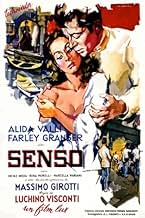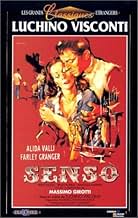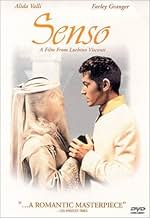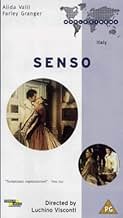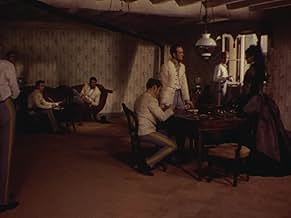AVALIAÇÃO DA IMDb
7,4/10
9,3 mil
SUA AVALIAÇÃO
Na segunda metade do século XIX, durante a guerra de unificação italiana contra a Áustria, uma condessa italiana se envolve emocionalmente com um soldado austríaco, arriscando trair a causa ... Ler tudoNa segunda metade do século XIX, durante a guerra de unificação italiana contra a Áustria, uma condessa italiana se envolve emocionalmente com um soldado austríaco, arriscando trair a causa italiana.Na segunda metade do século XIX, durante a guerra de unificação italiana contra a Áustria, uma condessa italiana se envolve emocionalmente com um soldado austríaco, arriscando trair a causa italiana.
- Direção
- Roteiristas
- Artistas
- Prêmios
- 3 vitórias e 2 indicações no total
Franco Arcalli
- Un soldato
- (não creditado)
Aldo Bajocchi
- Un soldato
- (não creditado)
Ottone Candiani
- Un soldato
- (não creditado)
Nando Cicero
- Un soldato
- (não creditado)
Claudio Coppetti
- Un soldato
- (não creditado)
Cristoforo De Hartungen
- Il generale Hauptmann
- (não creditado)
Tony Di Mitri
- Un soldato
- (não creditado)
Avaliações em destaque
Whatever Anton Bruckner had in mind when writing his majestic Seventh Symphony, it probably wasn't as the score to a postwar Italian love story set during the Italian-Austrian conflicts of the Risorgiamento. Though the use of pre-existing classical music as backdrop for films is to be discouraged, here it works in surprising ways. Alida Valli is the Countess Livia Serpieri, in a loveless marriage to an older, collaborationist official. At the opera (Venice's La Fenice during Il Trovatore!) she meets up with a dashing young Austrian officer, Farley Granger. (Digression: After a handful of American films -- They Live by Night, Rope, Side Street, Strangers on a Train -- Granger journeyed to Italy to work with Visconti then fell off the screen for years, only to resurface in a few schlock films in the late 60s and early 70s. What happened to him?) They kindle up a clandestine and dangerous affair -- the wealthy older woman and the manipulative wastrel. After wheedling a small fortune out of her to bribe a doctor who declares him unfit to serve, he dumps her. But hell hath no fury....Luchino Visconti, assisted by the young Franco Zeffirelli -- both were opera directors, too -- pulls out all the stops, ending with a finale reminiscent of Tosca (but with a twist). Senso is a shameless and unforgettable wallow in Italianate passion -- unabashed verismo translated to the silver screen.
Wonderful movie, and quite unexpected at the time from the neorealist Visconti, finally letting some of the operatic juice flow into his film work. It's also the first of his explorations of Italian history and social change, to be followed by The Leopard and the fantastic Rocco and His Brothers.
One caveat: At a screening a couple of years ago at MoMA, I learned that it was the Italian government that was responsible for the snipping of some crucial scenes near the end of Senso, depicting the Battle of Custozza. These were meant to make his critique of the Italian ruling classes and their failure to pull together during this period of the risorgimento more explicit. But apparently the Italian government, fresh from defeat in WW II, didn't like the idea of a major movie showing an Italian army being beaten. So the episode was truncated, leaving a few people scratching their heads about what the point of it all was. Poor Visconti tended to make long movies, and often had trouble getting them shown at the proper length in the US, but this time it was his own government that stymied him!
As for the rest: Granger is fine, but it's Valli who gives one of the all-time great move star performances. What a great face! The story is written on it, and the director wisely keeps her the focus of attention.
One caveat: At a screening a couple of years ago at MoMA, I learned that it was the Italian government that was responsible for the snipping of some crucial scenes near the end of Senso, depicting the Battle of Custozza. These were meant to make his critique of the Italian ruling classes and their failure to pull together during this period of the risorgimento more explicit. But apparently the Italian government, fresh from defeat in WW II, didn't like the idea of a major movie showing an Italian army being beaten. So the episode was truncated, leaving a few people scratching their heads about what the point of it all was. Poor Visconti tended to make long movies, and often had trouble getting them shown at the proper length in the US, but this time it was his own government that stymied him!
As for the rest: Granger is fine, but it's Valli who gives one of the all-time great move star performances. What a great face! The story is written on it, and the director wisely keeps her the focus of attention.
Opens with a lush rendition of Il Trovatore at Teatro La Fenice, SENSO is an ostentatious melodrama imprinted with Visconti's pronounced blue blood opulence, retells an Italian countess' (Valli) vain and poignant attempt to pursue her one-sided affection to an Austrian officer (Granger shines in the rich Technicolor palette as an Adonis), whose misogyny and promiscuity will cause his own doom and mar her mentality up to the hilt.
The film sets its time during the fall of Austrian occupation in Venezia 1866, Valli is wavering between her bureaucratic husband (Moog) and rioting cousin (Girotti), to break loose from the stalemate, she irrevocably falls for a young lieutenant in the opponent camp, but he is no knight in shining armor but a foul and spineless scoundrel with irresistible sheen of deadly charm. Granger's gorgeous lover-boy image is a quintessential smokescreen to veil his despicable innards, but after all, it is a consensual deal despite of Valli's false hope, more significantly its anti-war signals have been forcibly cast by Granger's self-abandonment and the lousy war battlefield experienced by Girotti, which, more plausibly it is an intentional move by Visconti, a distraction from the central turmoil, but done with a tinge of amateurish fecklessness.
Valle shoulders on a profound effort to scrutinize a woman's inscrutable sexual desire which being repressed for too long, both she and Granger align themselves with Visconti's brimful-of- emotion style (again, thanks to Techincolor and the overstuffed score as well) which approximate the OTT threshold in certain degree, although falling out with Visconti eventually, Granger succeeds in bringing about his best screen persona and it was such a great era when a gay man can play an outright straight womanizer on the celluloid.
On the one hand SENSO fails to impress me as my favorite among Visconti's work of art, and scale-wise pales by comparison with LUDWIG (1972, 8/10) and THE LEOPARD (1963, 8/10), but on the other hand, only Visconti can flaunt such an overbearing melodrama with true mettle and without any compromise, a trend-setter would inspire later kindred spirits, for instance Baz Luhrmann's 3D adaption of the bourgeois sumptuosity THE GREAT GATSBY (2013, 8/10).
The film sets its time during the fall of Austrian occupation in Venezia 1866, Valli is wavering between her bureaucratic husband (Moog) and rioting cousin (Girotti), to break loose from the stalemate, she irrevocably falls for a young lieutenant in the opponent camp, but he is no knight in shining armor but a foul and spineless scoundrel with irresistible sheen of deadly charm. Granger's gorgeous lover-boy image is a quintessential smokescreen to veil his despicable innards, but after all, it is a consensual deal despite of Valli's false hope, more significantly its anti-war signals have been forcibly cast by Granger's self-abandonment and the lousy war battlefield experienced by Girotti, which, more plausibly it is an intentional move by Visconti, a distraction from the central turmoil, but done with a tinge of amateurish fecklessness.
Valle shoulders on a profound effort to scrutinize a woman's inscrutable sexual desire which being repressed for too long, both she and Granger align themselves with Visconti's brimful-of- emotion style (again, thanks to Techincolor and the overstuffed score as well) which approximate the OTT threshold in certain degree, although falling out with Visconti eventually, Granger succeeds in bringing about his best screen persona and it was such a great era when a gay man can play an outright straight womanizer on the celluloid.
On the one hand SENSO fails to impress me as my favorite among Visconti's work of art, and scale-wise pales by comparison with LUDWIG (1972, 8/10) and THE LEOPARD (1963, 8/10), but on the other hand, only Visconti can flaunt such an overbearing melodrama with true mettle and without any compromise, a trend-setter would inspire later kindred spirits, for instance Baz Luhrmann's 3D adaption of the bourgeois sumptuosity THE GREAT GATSBY (2013, 8/10).
A feast for the eyes this lush melodrama may be an acquired taste for some but I doubt anyone could say it wasn't visually stunning. Venice is rendered so beautifully you will want to hop the next flight there and with the composition of all the other scenes it is like watching a story take place inside of paintings. However as gorgeous as all that is it also can be distracting and take you out of the story as you study the detail which at times feels a bit surreal. Having only seen Alida Valli in her English language films where she often seemed stiff and ill at ease her performance here is quite a revelation. She is fully in command of the screen and her anguished turmoil is compelling to watch. Farley is not bad although his part really doesn't offer him much more than being a slick and very handsome wastrel.
I have rated this film 9 because of it's length, there are some ponderous moments, but otherwise it is a 10. Italian cinema was still having growing pains from the war, but this epic succeeds, and skillfully incorporates the war torn landscape into this tale of an earlier war. The music score is very big and melodramatic, but fitting. The film opens with an opera in an enormous opera house, and this is fitting for the grand scale and operatic scope of this romance and the background. This is "Gone With the Wind" - Italian style - with a much more sympathetic heroine.
I am a fan of Alida Valli and have sought out her work. Perhaps because this is in her native Italian, and/or because of her Italian director, she is a full, vital, feminine woman in this film; very different from her more restrained work in America. (Her breathtaking performance in "The Paradine Case" is a study in austerity and an almost masculine stillness.) I had hoped that we would see a more free actress in her native language, and we do! She flutters and tosses her hair, she is a Countess reveling in her earthy affair. This is a full bodied performance.
Farley Granger's performance, whether in response to Valli, or just given a really meaty bad-boy to play, is a total revelation. He is lusty and sexy, provocative, pouty and passionate. In one scene, he greets her by wordlessly grabbing her hand and almost devouring it with kisses. This is a rare film where both the woman AND the man have real powerhouse roles. The confrontation scene at the end is gripping.
A small but pivotal role is played by Marcella Mariani. Her cow-like leadenness, laced with sisterhood, bespeaks a worldliness that, paired with her ethereal youthful beauty is just wrenching. All supporting roles, especially the maids, are interesting and give a sense of intrigue throughout.
A previous reviewer mentioned that the outcome of a major plot point is cut out, which leaves you wondering... "but what happened with that?" Still, the major story is the romance, which I think will be satisfying for men as well as women, because both sides are given such full emotional life. IF YOU CAN FIND IT, it is an enjoyable, big emotion, epic wartime romance.
I am a fan of Alida Valli and have sought out her work. Perhaps because this is in her native Italian, and/or because of her Italian director, she is a full, vital, feminine woman in this film; very different from her more restrained work in America. (Her breathtaking performance in "The Paradine Case" is a study in austerity and an almost masculine stillness.) I had hoped that we would see a more free actress in her native language, and we do! She flutters and tosses her hair, she is a Countess reveling in her earthy affair. This is a full bodied performance.
Farley Granger's performance, whether in response to Valli, or just given a really meaty bad-boy to play, is a total revelation. He is lusty and sexy, provocative, pouty and passionate. In one scene, he greets her by wordlessly grabbing her hand and almost devouring it with kisses. This is a rare film where both the woman AND the man have real powerhouse roles. The confrontation scene at the end is gripping.
A small but pivotal role is played by Marcella Mariani. Her cow-like leadenness, laced with sisterhood, bespeaks a worldliness that, paired with her ethereal youthful beauty is just wrenching. All supporting roles, especially the maids, are interesting and give a sense of intrigue throughout.
A previous reviewer mentioned that the outcome of a major plot point is cut out, which leaves you wondering... "but what happened with that?" Still, the major story is the romance, which I think will be satisfying for men as well as women, because both sides are given such full emotional life. IF YOU CAN FIND IT, it is an enjoyable, big emotion, epic wartime romance.
Você sabia?
- CuriosidadesThe film opens in La Fenice, the Venice opera house. La Fenice was destroyed by arson in 1996, but reopened in 2003. Enlarged frames of this movie were used as a reference in reconstructing it.
- Citações
Il tenente Franz Mahler: It's too late! It's over! I'm not your romantic hero!
- Versões alternativasTwo versions of the film are available on video.
- One version is missing the scene where Livia tries to explain where all the money meant for the troops went.
- Another version is missing the climatic battle sequence between the Austrian and Italian troops.
- ConexõesEdited into Histoire(s) du cinéma: La monnaie de l'absolu (1999)
- Trilhas sonorasSinfonia N. 7 in mi maggiore (7th Symphony)
Music by Anton Bruckner
Performed by Orchestra Sinfonica Nazionale della Rai
Conducted by Franco Ferrara
Principais escolhas
Faça login para avaliar e ver a lista de recomendações personalizadas
- How long is Senso?Fornecido pela Alexa
Detalhes
- Data de lançamento
- País de origem
- Idiomas
- Também conhecido como
- Senso - Sedução da Carne
- Locações de filme
- Teatro La Fenice, Veneza, Vêneto, Itália(opening scenes)
- Empresa de produção
- Consulte mais créditos da empresa na IMDbPro
Bilheteria
- Orçamento
- ITL 700.000.000 (estimativa)
- Faturamento bruto nos EUA e Canadá
- US$ 27.723
- Fim de semana de estreia nos EUA e Canadá
- US$ 3.984
- 28 de out. de 2018
- Faturamento bruto mundial
- US$ 27.723
- Tempo de duração2 horas 3 minutos
- Cor
Contribua para esta página
Sugerir uma alteração ou adicionar conteúdo ausente

Principal brecha
By what name was Sedução da Carne (1954) officially released in India in English?
Responda
![Assistir a Trailer originale italiano [OV]](https://m.media-amazon.com/images/M/MV5BYzc0Y2MyOGMtMzg0My00Mzc4LWIwYjItZjg1ZDhmMDZmOTlkXkEyXkFqcGdeQXRodW1ibmFpbC1pbml0aWFsaXplcg@@._V1_QL75_UX500_CR0)

